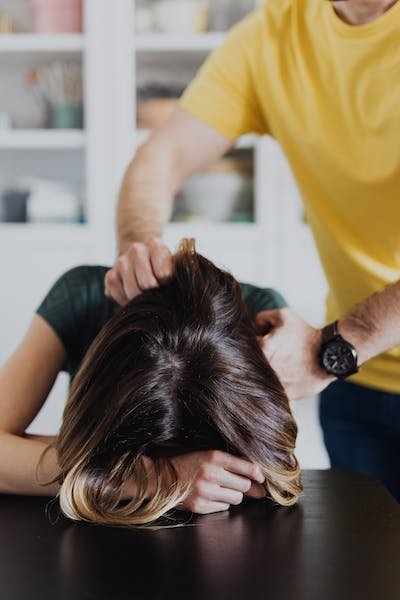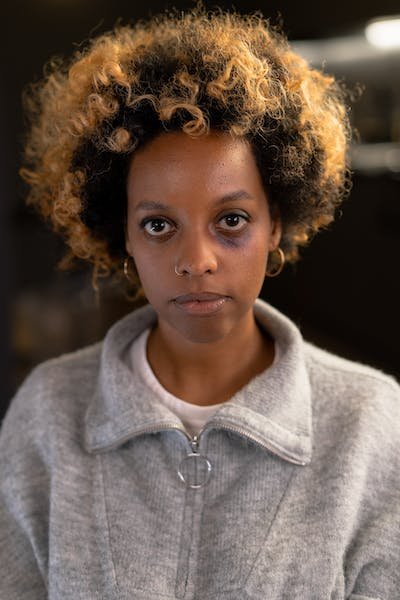Years ago close to a decade, the federal government first classed domestic violence as a national emergency, which meant that it was given special focus in the media and in national priorities. The term is often used synonymously with abuse, but it is distinct from physical or verbal violence in an intimate relationship. Most times whenever you see domestic violence talked about, it is resulting to abuse.
If we are to look at what domestic violence really means, I will say a primary definition of domestic violence is “a pattern of abusive behavior that includes threats, intimidation, or physical violence by a current or former spouse, co-worker, or other family member.” This definition includes physical and sexual abuse, as well as threats which is capable of ending ones life and causing massive emotional damage.
if we should study our society well, you will agree with me that physical and sexual abuse are the most common types of domestic violence. More than half of all cases of domestic violence end up to be physical in nature
Although many people think of domestic violence as a “spouse” issue, I will shock us by saying even children often suffer from the effects of domestic violence. In fact, children as young as 10 can be abused by a parent or any kind of caregiver. In fact most cases, children tend to be at the receiving end most of the effect of domestic violence because it goes a long way in determining who they grow up to be and the future they will find themselves in years later.
Hace cerca de una década, el gobierno federal clasificó por primera vez la violencia doméstica como emergencia nacional, lo que supuso prestarle especial atención en los medios de comunicación y en las prioridades nacionales. El término se utiliza a menudo como sinónimo de maltrato, pero es distinto de la violencia física o verbal en una relación íntima. La mayoría de las veces, cuando se habla de violencia doméstica, se hace referencia a los malos tratos.
Si vamos a analizar lo que realmente significa violencia doméstica, diré que una definición primaria de violencia doméstica es "un patrón de comportamiento abusivo que incluye amenazas, intimidación o violencia física por parte de un cónyuge actual o anterior, un compañero de trabajo u otro miembro de la familia". Esta definición incluye el abuso físico y sexual, así como las amenazas que son capaces de acabar con la vida de uno y causar un daño emocional masivo.
Si estudiamos bien nuestra sociedad, convendrán conmigo en que los abusos físicos y sexuales son los tipos más comunes de violencia doméstica. Más de la mitad de los casos de violencia doméstica acaban siendo de naturaleza física.
Aunque mucha gente piensa que la violencia doméstica es una cuestión de "cónyuges", voy a escandalizarnos diciendo que incluso los niños sufren a menudo los efectos de la violencia doméstica. De hecho, niños de tan sólo 10 años pueden ser maltratados por uno de sus padres o por cualquier tipo de cuidador. De hecho, en la mayoría de los casos, los niños suelen ser los que más sufren los efectos de la violencia doméstica, porque determina en gran medida quiénes serán de mayores y el futuro que les aguarda años más tarde.

Many people ask the question what will happen to children if a marriage or relationship has high risk of abuse? because they’re concerned about how their child’s relationship with their partner will turn out if the child is the victim of domestic violence. The good news is that children whose parents have been abused or have engaged in DV have a much better chance of having healthy, lasting relationships than those whose parents are healthy. I believe you might be thinking this statement just contradict to what I said in the earlier paragraph.
The reason is because children of abused people are often more likely to experience higher levels of stress, anxiety, and depressionall of which can make them more likely to communicate through violence. They are also more likely to engage in substance abuse, have health problems, and experience sexual assault.
Many people who suffer from domestic violence are unaware that they have a problem. This is likely because they either don’t know how prevalent the problem is, or they choose to ignore its effects on their life.
Regardless of the reason, the fact remains that domestic violence has negative effects on individuals, their relationships, and even their communities. It can have a significant impact on an individual’s ability to function in their daily life.
Even though you might not agree with me but to my best knowledge, I think domestic violence has some benefits 🙂. Though that doesn't mean I am encouraging domestic violence but that's just one of the things I have noticed so far. You know most times, we focus on the negativity of a particular situation and we tend to ignore out the positivity of the situation which should not be so.
Muchas personas se preguntan qué ocurrirá con los niños si un matrimonio o una relación tienen un alto riesgo de malos tratos, porque les preocupa cómo será la relación de su hijo con su pareja si el niño es víctima de la violencia doméstica. La buena noticia es que los niños cuyos padres han sufrido malos tratos o han ejercido la violencia doméstica tienen muchas más >posibilidades de tener relaciones sanas y duraderas que aquellos cuyos padres están sanos. Creo que estarás pensando que esta afirmación se contradice con lo que he dicho en el párrafo anterior.
La razón es que los hijos de personas maltratadas suelen ser más propensos a experimentar mayores niveles de estrés, ansiedad y depresión, todo lo cual puede hacerlos más propensos a comunicarse mediante la violencia. También es más probable que abusen de sustancias, tengan problemas de salud y sufran agresiones sexuales.
Muchas personas que sufren violencia doméstica no son conscientes de que tienen un problema. Esto se debe probablemente a que o bien no saben lo frecuente que es el problema, o bien optan por ignorar los efectos que tiene en su vida.
Sea cual sea el motivo, lo cierto es que la violencia doméstica tiene efectos negativos en las personas, sus relaciones e incluso sus comunidades. Puede tener un impacto significativo en la capacidad de un individuo para funcionar en su vida diaria.
Aunque puede que no estés de acuerdo conmigo, pero hasta donde yo sé, creo que la violencia doméstica tiene algunos beneficios 🙂 . Aunque eso no significa que esté fomentando la violencia doméstica pero es sólo una de las cosas que he notado hasta ahora. La mayoría de las veces, nos centramos en lo negativo de una situación en particular y tendemos a ignorar lo positivo de la situación, lo cual no debería ser así.

The benefits of domestic violence include the ability to save money when two people are able to agree on the division of property, the ability to negotiate child support payments, and the protection from both physical and legal violence that comes with a healthy and stable relationship.
This last benefit is perhaps the most important of all. It allows people with long-term, intimate relationships to be safe from physical or emotional abuse. If you or your partner has been the victim of abuse, you may find the protection and stability of a healthy relationship amazing gifts.
Now do you know that there are many ways that people tackle barriers to empowerment following abuse, but the best way is always the most upfront way by asking. If you or your partner is hesitant to open up about your past, or you’re unsure how to ask, you can always start with a question.
“How do you really feel?” how simple that question might really look but trust me, it carries so much power. The simpleYes orNo question can provide insight into how you’re feeling. If you find that you don’t want to open up about it, you can always start with a question about how you’re feeling instead. This process will help you uncover your needs and wants, allowing you to move forward with your life more effectively.
The risks of marrying or having a long-term relationship are significant. Even if you’ve been in a healthy relationship before, the prospect of being in one with a violent partner is daunting.
If you’re thinking about taking that next step and getting married, you may want to familiarize yourself with the effects of domestic violence on children. It’s important to know that children of domestic violence can grow up to be healthy and happy individuals, with great potential.
If you are concerned about the effects of domestic violence on your child, there are resources to help. You can discuss your concerns with a qualified child maltreatment expert or a psychologist.
Entre los beneficios de la violencia doméstica figuran la posibilidad de ahorrar dinero cuando dos personas son capaces de ponerse de acuerdo sobre la división de bienes, la posibilidad de negociar los pagos de manutención de los hijos y la protección contra la violencia tanto física como legal que conlleva una relación sana y estable.
Esta última ventaja es quizá la más importante de todas. Permite a las personas con relaciones íntimas de larga duración estar a salvo de abusos físicos o emocionales. Si usted o su pareja han sido víctimas de malos tratos, la protección y la estabilidad de una relación sana pueden resultarles regalos asombrosos.
Ahora bien, sabes que hay muchas formas en que las personas abordan las barreras que impiden su empoderamiento tras los malos tratos, pero la mejor forma es siempre la más directa, preguntando. Si tú o tu pareja dudáis en abriros sobre vuestro pasado, o no estáis seguros de cómo preguntar, siempre podéis empezar con una pregunta.
"¿Cómo te sientes realmente?" Qué simple puede parecer esta pregunta, pero créeme, tiene mucho poder. La simple pregunta de "Sí" o "No" puede darte una idea de cómo te sientes. Si ves que no quieres abrirte, siempre puedes empezar con una pregunta sobre cómo te sientes. Este proceso te ayudará a descubrir tus necesidades y deseos, permitiéndote avanzar en tu vida con mayor eficacia.
Los riesgos de casarse o tener una relación duradera son importantes. Aunque hayas tenido antes una relación sana, la perspectiva de tener una con una pareja violenta es desalentadora.
Si estás pensando en dar el siguiente paso y casarte, quizá quieras familiarizarte con los efectos de la violencia doméstica en los niños. Es importante saber que los hijos de víctimas de violencia doméstica pueden llegar a ser personas sanas y felices, con un gran potencial.
Si le preocupan los efectos de la violencia doméstica en su hijo, existen recursos para ayudarle. Puede hablar de sus preocupaciones con un experto cualificado en maltrato infantil o con un psicólogo.
This topic is very interesting, violence in the home has a negative emotional impact on children, it involves many important points, thank you for sharing.
Very well said. This topic has been overlooked by a lot of people thereby it need to be talked about several times because it involves a lot of point just like you said